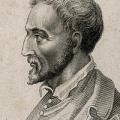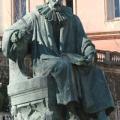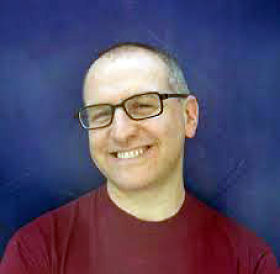364. Guido Giglioni on Renaissance Medicine
An interview with Guido Giglioni, who speaks to us about the sources and philosophical implications of medical works of the Renaissance.
Themes:
• G. Giglioni, “Autobiography as Self-Mastery: Writing, Madness, and Method in Girolamo Cardano,” Bruniana e Campanelliana 7 (2001), 331-62.
• G. Giglioni, “Girolamo Cardano on the Passions and their Treatment,” Bruniana et Campanelliana 12 (2006), 25-40.
• G. Giglioni, “Synesian Dreams: Girolamo Cardano on Dreams as Means of Prophetic Communication,” Bruniana e Campanelliana 16 (2010), 575-84.
• G.M. Giglioni, "Coping with Inner and Outer Demons: Marsilio Ficino’s Theory of the Imagination," in Diseases of the Imagination and Imaginary Disease in the Early Modern Period (Turnhout: 2011), 19-51.
• G.M. Giglioni, "Historia and materia: The philosophical implications of Francis Bacon's natural history," Early Science and Medicine 17 (2012), 62-86.
• G.M. Giglioni, "Medicine of the Mind in Early Modern Philosophy," in The Routledge Handbook of the Stoic Tradition (London: 2016), 189-203
• G.M. Giglioni, "Medical Approaches to the Mind in the Late Middle Ages and the Renaissance," in Philosophy of Mind in the Late Middle Ages and Renaissance (London: 2018), 41-62.
• G.M. Giglioni, "Touch Me Not: Sense and Sensibility in Early Modern Botany," Early Science and Medicine 23 (2018), 420-43.
• G.M. Giglioni, "If you don't feel pain, you must have lost your mind: The early modern fortunes of a Hippocratic aphorism," in Et amicorum: Essays on Renaissance Humanism and Philosophy in Honour of Jill Kraye (Leiden: 2018), 313-37.
• G.M. Giglioni, "Health in the Renaissance," in P. Adamson (ed.), Health: A History (Oxford: 2019), 141-73.







Comments
Renaissance Gaps?
Dear Prof.,
I'm not sure where to ask this question, but as this is the latest episode, I'll ask here. I viewed the timeline here on the HoPwG site for Renaissance philosophy and noted two people missing, whom I hope you actually do plan on covering philosophically. The first is famous for his architectural works, Andrea Di Pietro della Gondola, better known as Palladio. (His mentor, Gian Giorgio Trissino, is also known as a scholar and grammarian). The second is the architect Giacomo da Vignola, often referred to as Giacomo Barocchio, Barocio, or Barozzi. His philosophical importance is apparently enough that Dominic O'Meara mentioned him in the interview on Podcast episode 96 regarding his importance in publishing a translation of Proclus book on Euclid. Barozzi appears to have been involved in translation of multiple philosophical texts, so there's at least popularization, if not transfer that you've so often discussed over the year. I almost went and asked this back to episode 96 to submit this, but then, these men are really in the Renaissance era. I'm interested the philosophy that these men all wrote about, but grouped them together here as I'm interested in their views of the "neo-classical" architecture and mathematics, especially as related to philosophy. Thanks again for the wonderful work. - Dave
In reply to Renaissance Gaps? by Dave Lavery
Archtecture
Right, I could no doubt have done a whole episode just on architecture! I missed the figures you mention here but architecture is discussed to some extent in episode 361.
In reply to Archtecture by Peter Adamson
Architectural comments
Yes, I was very interested in that and purchased the book on Alberti. I'm looking for sources for further information on these men from similarly reputable sources as well. I'm always thankful for what you introduce and then the further reading. If you happen to know modern experts (I suppose in addition to Professor O'Meara) who have published on these three and you'd recommend, please let me know. There's at least one article on research gate, but I don't have access, since I'm not a student.
Add new comment